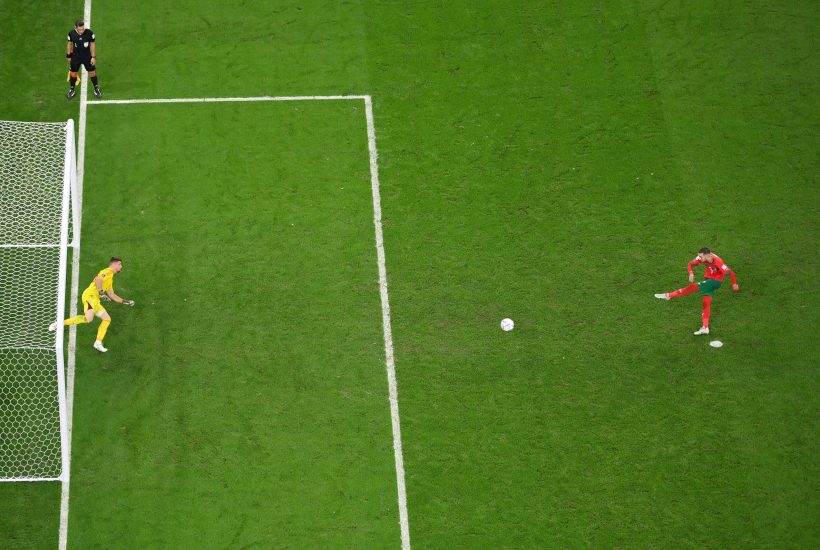Spain crashed out of the World Cup on penalties last night, despite dominating possession against Morocco for two solid hours. Pretty much everyone bar Spaniards will be delighted by this giant-killing by Morocco, who are just the fourth African team to reach the quarter-finals in football history.
But their penalty success is nothing to celebrate. Much as it would be great to see less-fancied nations do well at the World Cup, it would be better if this was achieved by scoring more goals, rather than parking the bus and running down the clock.
Spain were the better team last night. While it’s fun for footballing giants to lose now and again, penalty shoot-outs are not good for the game. This may be due to the psychological burden of having established your superiority over your opponents in normal time, but then having to reconfigure your thinking for a one-off crap shoot from the penalty spot.
Spain looked scared last night and no wonder. They had far more to lose, knowing that all their hard work could well have been in vain. By contrast, Morocco were in a far healthier frame of mind. They were happy to be there. Their game plan had worked, so why shouldn’t it keep on working?
Penalty kicks favour certain players with certain mindsets and there is no clear correlation with footballing ability. Some great players have missed penalties at the World Cup, including Platini, Zico, Maradona, Baggio, and Messi twice. Johann Cruyff refused to take them, arguing they were an inferior art that had little relation to in play technique. In other words, they are more a test of nerve than of footballing ability.
The burden on players is excessive. Even if they are fantastically rewarded for their exertions and live privileged existences, the unforgiving penalty shoot-out is a step too cruel. One crucial miss and the scarlet letter might as well be stitched into their team shirt ever after.
Roberto Baggio, despite a wonderful career, has been haunted by his miss in the final of World Cup 1994 ever since. Of the pain he wrote in his autobiography: ‘It hasn’t diminished, and I don’t think it will ever go away’. Chris Waddle and Stuart Pearce suffered terribly after their misses in 1990. And I sometimes wonder if Gareth Southgate’s obsession with making the world a kinder, fairer place is in some way connected to his own humiliation at Euro 1996. Is Southgate the footballing equivalent of John Profumo, who devoted his life to charity work in the East End after his downfall?
Are there any realistic alternatives? Prior to the 1962 World Cup in Chile there was provision for replays, but with increasingly congested fixture lists Fifa decided tied games in the quarter and semi-finals would be decided by the drawing of lots.
This method was accepted as long as it was theoretical, but when it was used to decide the Olympic quarter final between Bulgaria and Israel in 1968 the aggrieved, losing Israelis petitioned Fifa to adopt penalties. The proposal was agreed to, and the rest is history.
There is even less time for replays now, and lots would be unthinkable, which leaves only one other option that has been used in Fifa accredited international matches: a corner count. This system decided the All-Africa Games tournament in 1965, which Congo won against Mali (seven corners to five) having beaten Ethiopia ten corners to one earlier in the same tournament.
Would this work? Is it fair? Deciding games in this way has the advantage of at least reflecting which team had tried harder to score goals as opposed to not conceding them. It’s also hard to see a loophole; any player that was in a position to cross the ball into the box would surely do that rather than hoping to contrive a corner – a strategy which would probably fail as often as succeed anyway.
Spain won eight corners to Morocco’s zero last night, meaning Morocco, even if they had played it cagey for most of the game, would have to have opened up sooner or later, making for a far more exciting game. Penalties would only be used if the corner count were tied, so fans of the faux drama of the spot kick would still get the occasional fix.
Dropping penalties is worth a go. It might save a lot of trauma and heartache. If England lose on penalties on Saturday against France, it would be their eighth such loss from eleven attempts. That might be more than the nation could bear and could seriously blight the future career of one or more of England’s young stars – a couple of whom are hardly more than boys.
Losing to France on corners would be annoying but just about tolerable. ‘Merde… encore?’ vs ‘C’est la vie’ about sums it up.
The post Let’s kick penalties out of football appeared first on The Spectator.
Got something to add? Join the discussion and comment below.
Get 10 issues for just $10
Subscribe to The Spectator Australia today for the next 10 magazine issues, plus full online access, for just $10.



















Comments
Don't miss out
Join the conversation with other Spectator Australia readers. Subscribe to leave a comment.
SUBSCRIBEAlready a subscriber? Log in